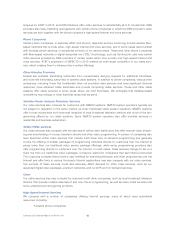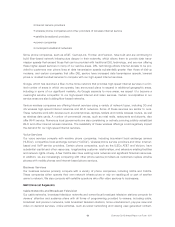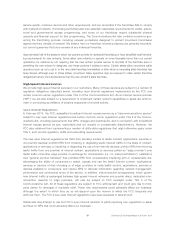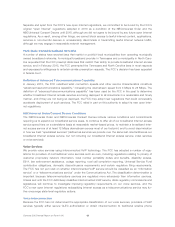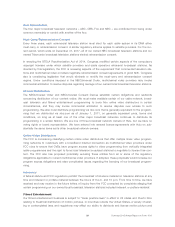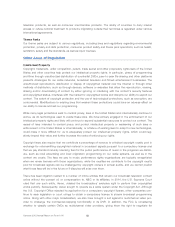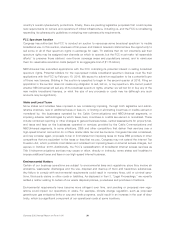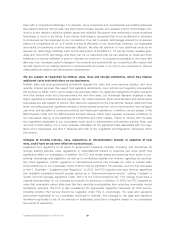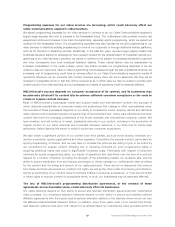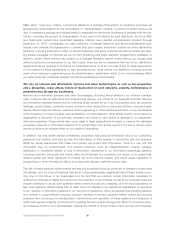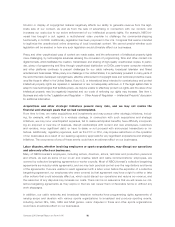Comcast 2015 Annual Report Download - page 25
Download and view the complete annual report
Please find page 25 of the 2015 Comcast annual report below. You can navigate through the pages in the report by either clicking on the pages listed below, or by using the keyword search tool below to find specific information within the annual report.
television products, as well as consumer merchandise products. The ability of countries to deny market
access or refuse national treatment to products originating outside their territories is regulated under various
international agreements.
Theme Parks
Our theme parks are subject to various regulations, including laws and regulations regarding environmental
protection, privacy and data protection, consumer product safety and theme park operations, such as health,
sanitation, safety and fire standards, as well as liquor licenses.
Other Areas of Regulation
Intellectual Property
Copyright, trademark, unfair competition, patent, trade secret and other proprietary rights laws of the United
States and other countries help protect our intellectual property rights. In particular, piracy of programming
and films through unauthorized distribution of counterfeit DVDs, peer-to-peer file sharing and other platforms
presents challenges for our cable networks, broadcast television and filmed entertainment businesses. The
unauthorized reproduction, distribution or display of copyrighted material over the Internet or through other
methods of distribution, such as through devices, software or websites that allow the reproduction, viewing,
sharing and/or downloading of content by either ignoring or interfering with the content’s security features
and copyrighted status, interferes with the market for copyrighted works and disrupts our ability to exploit our
content. The extent of copyright protection and the use of technological protections, such as encryption, are
controversial. Modifications to existing laws that weaken these protections could have an adverse effect on
our ability to license and sell our programming.
While many legal protections exist to combat piracy, laws in the United States and internationally continue to
evolve, as do technologies used to evade these laws. We have actively engaged in the enforcement of our
intellectual property rights and likely will continue to expend substantial resources to protect our content. The
repeal of laws intended to combat piracy and protect intellectual property or weakening of such laws or
enforcement in the United States or internationally, or a failure of existing laws to adapt to new technologies,
could make it more difficult for us to adequately protect our intellectual property rights, which could neg-
atively impact their value and further increase the costs of enforcing our rights.
Copyright laws also require that we contribute a percentage of revenue to a federal copyright royalty pool in
exchange for retransmitting copyrighted material in broadcast signals pursuant to a compulsory license and
that we pay standard industry licensing fees for the public performance of music in the programs we distrib-
ute, such as local advertising and local origination programming on our cable systems, as well as in the
content we create. The fees we pay to music performance rights organizations are typically renegotiated
when we renew licenses with those organizations, while the royalties we contribute to the copyright royalty
pool for broadcast signals can be challenged by copyright owners in annual audits, and we cannot predict
whatthosefeeswillbeinthefutureor if disputes will arise over them.
There has been litigation related to a number of online entities that stream our broadcast television content
online without the consent of, or compensation to, NBC or its affiliates. In 2014, the U.S. Supreme Court
ruled that one such entity, Aereo, violated the broadcasters’ exclusive right to perform their copyrighted
works publicly. Subsequently, Aereo sought to operate as a cable system under the Copyright Act. Although
the U.S. Copyright Office rejected its application for a compulsory copyright license, other companies con-
tinue to seek legislation or court rulings to obtain a compulsory license to stream broadcast programming
online. Along with other major broadcasters, we also have brought a suit against a multichannel video pro-
vider to challenge the commercial-skipping functionality in its DVR. In addition, the FCC is considering
whether to classify certain OVDs as multichannel video providers, giving them the right to negotiate for
Comcast 2015 Annual Report on Form 10-K 22


